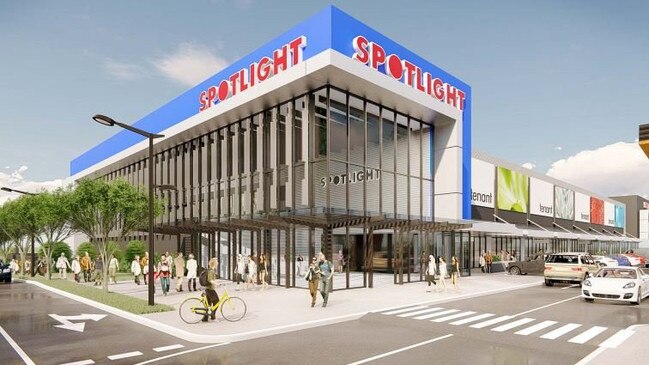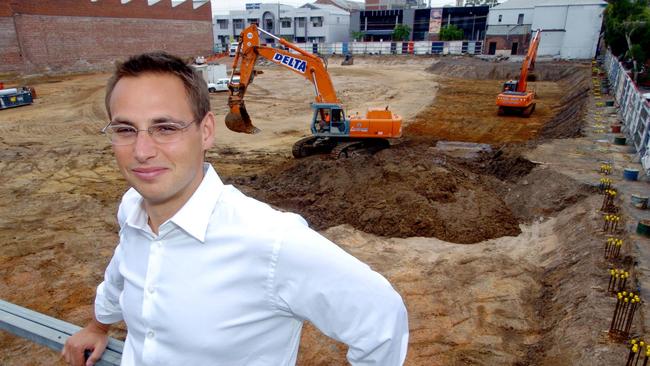Spotlight to roll out 150 stores in five years in bet on future of bricks and mortar retail
The country’s biggest Spotlight shop is under construction in a $250m southeast Queensland retail hub that will also feature Harris Scarfe and Anaconda.
The $2bn retail giant Spotlight Group plans to open 150 stores over the next five years as it bets on a relatively bright future for its bricks-and-mortar brands.
Spotlight has revealed it will build its biggest ever Spotlight store at Maroochydore on the Sunshine Coast in Queensland, where it is undertaking a $250m mixed-use project over several stages in one of the fastest-growing regions in Australia.
The project serves as a blueprint of the future for the group, co-owned by the billionaire Fried and Fraid families and featuring the Spotlight, Anaconda and Harris Scarfe retail outlets.
All three businesses will feature in the development as it is rolled out progressively, with the large haberdashery-focused Spotlight acting as an anchor and open by early next year, and then a superstore of camping and outdoor brand Anaconda and a homewares-centred Harris Scarfe to follow.

There will also be extensive carparking and in a later stage a mixture of other retail, apartments, hotels or commercial office space built in the precinct.
“This is the perfect way of showcasing our three key retail brands in one development,” deputy executive chairman Zac Fried said. “But we are also looking at the future of what we are doing. Our primary focus is on the retail business, the rest grows around it. That’s the core; we are retailers at heart. We are in the business of rolling out stores.”
In a rare and wide-ranging interview, Mr Fried told The Australian the project was proof of Spotlight’s belief that customers still wanted to visit stores despite the rise of e-commerce and that retailers have to tweak the physical shopping experience accordingly to match demand.
“The customer wants both options, whether it is online — which is obviously very large in today’s climate during lockdown — and customers want to walk into a store. Customers can walk into Spotlight and spend two hours there, and walk around. You can do a lot online but you can’t do everything.
“Bricks and mortar is here to stay. Everyone talks about Amazon overseas, but they have [grocery chain] Wholefoods now too so you can see what is happening — they have both. Yes, some bricks-and-mortar stores may downsize or become showrooms. Everyone will have their own twist to it, but I’m sure of this.”
The private Spotlight Group has about 10,000 employees and $2.1bn in annual sales, making it one of the biggest retail groups in Australia. It traces its roots back to Mr Fried’s late father Ruben and uncle Morry Fraid, the group’s executive chairman, working at their family stall at the South Melbourne Markets before opening the first Spotlight in suburban Malvern in 1973.
Spotlight now has about 140 stores, Anaconda 70 outlets and Harris Scarfe is in 46 locations. There are plans for at least 10 new stores each per year and to expand in New Zealand, Singapore and potentially other parts of Asia.
“Across the three brands we have … committed to rolling out over the next five years almost 150 stories subject to the right deal and right locations — the retail business has to stand on its own and its own metrics,” Mr Fried said.

“They will be a mix of different sizes across the different brands. But it is more than what we have done in the five years. It is a 50 per cent increase on what we have been doing.”
Spotlight acquired the struggling Harris Scarfe last year for a reported $50m and has opened five new stores and relocated another since.
“We are very happy with the performance to date. We have been investing very heavily in that brand, marketing, stock, new IT system and we have moved pretty quick and shifted the design of the brand,” Mr Fried said.
“Harris Scarfe is very much in business. It is either the oldest or the second-oldest retail chain in Australia, and traces back to 1849 when the business was founded. Morry and I are very proud to have that business and to be able to carry it on into the future.”
About 10-20 per cent of Spotlight’s sales are online, depending on the brand, with Mr Freid saying customers may shop for some goods on websites or drop into stores that are well located with easy access.
“One thing COVID-19 has taught us is convenience shopping is really important,” he said. “You park outside and go inside, and you can get in and out pretty seamlessly and quickly.”
Each of the three brands will have tailored models depending on location, be it on Spotlight’s own land, in the HomeCo centres it has partnered with (Spotlight is a shareholder in HomeCo, which is building convenience centres in old Masters hardware stores) or in shopping centres.
Crucial to Spotlight’s expansion plan is the group’s own land bank it has steadily built up, and with which it plans to subtly change its property strategy over the coming years. While the retail element underpins the plans for the 1.5 million square metres of land in the group’s portfolio (only about one-third of which has been developed already), there will be other facets.
“We are currently in planning on four sites on the east coast for mixed-used developments,” Mr Fried said.
“They’re up to 35,00sq m in office space,up to 300 apartments in a couple of them, allowances for four to five hotels as well. We have the ability to do thousands of apartments on our lands if we choose. We can do six to eight hotels in the future on our land, but retail is at our heart.”
The group is already developing 72 apartments in Fremantle, Western Australia, in a joint venture with a local developer, and may look at a five-star hotel and retail complex on a site it owns in Melbourne’s Chapel Street. It has also built Bunnings stores in Sydney and Newcastle.
Mr Fried said he has had approaches from private equity firms or investors wanting to buy some or all of the group in recent years, but he is determined to keep in it family hands — having set up a structure in which there is an overall chief executive and each brand has its own CEO.
“There’s a quote I use and it is on the wall in my office: ‘We do not inherit the family business from our parents, we borrow it from our children’,” he said.
“We are in no rush, the business is set up for the future. I want my children and their children to have all the brands and for them to still be around in 100 and 150 years time.”






To join the conversation, please log in. Don't have an account? Register
Join the conversation, you are commenting as Logout